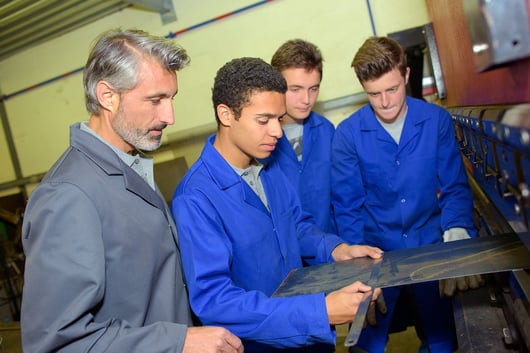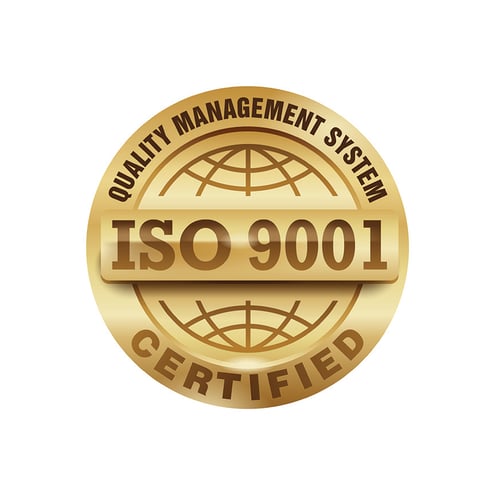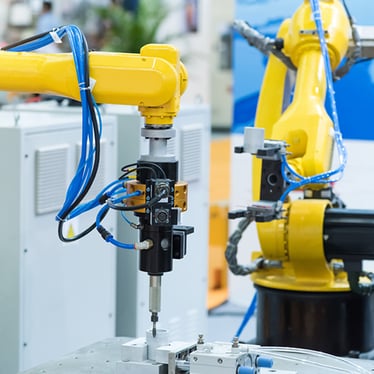To pique the interest of a new generation of talent and to continue to attract customers, manufacturers must think differently about how to showcase their businesses. Things like joining manufacturing associations and getting ISO certified can help manufacturing operations put their best foot forward. Adopting automation and exploring ways to navigate the new supply chain normal will also go a long way to keeping manufacturing operations fresh and current. Anything manufacturers can do to encourage the next generation of manufacturers to get interested and involved should be explored.
Hosts, Hannah Schmidt and Nicole Wolter of HM Manufacturing in Illinois led a discussion for USA Manufacturing Hour Chat on Twitter about the impact these topics have on manufacturing.
Groups, Organizations and Committees
Things kicked off with a discussion about the important of joining groups, trade organizations or committees. The hosts questioned whether people and their companies saw value in getting involved with these types of organizations.
Dan Bigger from Custom Profile in Michigan said, “Absolutely, I am encouraged to do so and I fit in as many as humanly possible. They are great resources for information and networking.”
Nigel Packer from PelaTis Online in Wales said, “ Yes, membership of peer organizations helps to keep in touch with your industry and find partners for projects. They usually have benefits from discounted exhibition stands and training programs that are focused on your industry.”
Julie Basello from Radwell International in New Jersey said, “Radwell belongs to many associations and groups-we are a big supporter of our local community for each of our locations.”
Rebecca Prox from DSI/Dynamic in Wisconsin said, “To a point, yes.”
 Chris Giglio from Zero Surge in New Jersey said, “Definitely! It helps to take part in the larger community that actively tries to bring positive changes across the industry.”
Chris Giglio from Zero Surge in New Jersey said, “Definitely! It helps to take part in the larger community that actively tries to bring positive changes across the industry.”
Jeanette Stevens from GenEdge Alliance in Virginia said, “Absolutely yes. The manufacturing community is pur community. So being a part of associations and groups is a must.”
Manufacturers’ News Inc said, “Absolutely!”
Kati McDermith, from Industry Net in Illinois said, “Yes! I work with Manufacturing Associations and groups to develop mutually beneficial relationships.”
“Yes!,” said John Buglino of Optessa Inc in New Jersey. He added, “I made it a focus of my brand elevation strategy earlier this year.”
Kirsten Austin from DCSC Inc in Missouri said, “What John said, we second that!”
Gail Robertson from Gail Now Marketing in Canada said, “Yes! As a Speaker/Marketing Consultant, it has made such a difference. Not only networking but also education that I couldn’t even pay to receive! So many bright minds to tap into! And definitely members receive value.”
Paul Kiesche from Aviate Creative in New Jersey said, “Yes, I think it's important, but it depends on which ones and how much time you commit to them.” He added, “However, for the purpose of networking and sales, I'd recommend joining groups where your prospect clients are rather than your competition.”
Phil Pond from Scarlet Opus in the UK said, “It isn't 'important' to a company's success. But it can be fun, supportive, educational and motivating.”
Sue Nordman from Obsidian Manufacturing in Illinois said, “Absolutely! The more networking you can do for your company, the better. It gives you and your company exposure while being a bigger part of something that is important to your industry.”
Chase Bodnar from Plastics Plus Technology in California said, “Depends on the function and purpose of the group, I think. For instance, we've been working more closely with California MEP and Cal Chamber of Commerce to expand our involvement. Curious to hear everyone's approach!”
Hosts, Schmidt and Wolter said, “At HM Manufacturing, we found that having employees like our CEO on boards introduces great opportunities for connections and networking.”
Influencing A New Generation of Manufacturers
The discussion then turned to how today’s manufacturers can influence and encourage the next generation of manufacturers.
Basello said, “Definitely through education. The next generation needs to see the benefits of a manufacturing career.”
Bigger said, “Getting involved. We are all advocates of manufacturing. The more kids, schools, groups, and organizations we can talk with will only raise awareness of the need for people in manufacturing. It will take all of us to complete the task. It's a big one.
Schmidt and Wolter said, “We couldn't agree more!!”
Prox said, “Education! We need to be proactive in reaching students before their last year of high school so they are aware of manufacturing jobs and we have to be open to them learning from us.”
Stevens said, “We can influence the next generation of manufacturers by being transparent, informative and providing them with educational support and resources. Also by being open about all they will get out of a career in manufacturing.”
Buglino said, “Introduce & share all the incredible advancements with Manufacturing>”
Sherri Darby from Wisco Lift in Wisconsin said, “The best way to influence and encourage the next generation to try manufacturing is by word of mouth. We have gotten several new people through other people within the company. They also know what to expect since they were referred.
Bigger responded, “Another great answer!”
Sam Gupta from ElevatIQ in Canada said, “The best way to encourage and influence would be to be the role model yourself and involve them as much as possible.”
 Giglio said, “Maybe starting programs as early as middle school that help clear up some of the stigmas that surround the industry. Also manufacturers going to schools during career day to show off all the benefits a career in the industry hold!”
Giglio said, “Maybe starting programs as early as middle school that help clear up some of the stigmas that surround the industry. Also manufacturers going to schools during career day to show off all the benefits a career in the industry hold!”
McDermith said, “I think being involved in manufacturing month and events help!”
Nigel Packer from PelaTis Online in Wales, UK added, “For the last 20 years I have been going into schools and colleges to speak to students about careers. Engaging the young to show them the joys of manufacturing, making products, innovating and talking about manufacturing gives them new options they had not considered. “
Ben Nordman from Obsidian Manufacturing in Illinois said, “Visit, show, and demonstrate what careers are out there in manufacturing. I think the lack of exposure from a young age to manufacturing pulls kids away from manufacturing careers.”
Nick Rivers from Obsidian Manufacturing in Illinois said, “Consistently reinforce the message that they are wanted and needed, in social media and in your community. Internships with High Schools and Colleges. Attend vocational days at local high schools.”
Sue Nordman added, “Reach back and helping the next generation come forward. We give back by offering a discount to tech schools and higher education institutions. We are in the process of setting up a job shadowing program with a local high school also.”
Bodnar said, “Provide opportunities within manufacturing that apply to a broader audience. Offer ways for those interested in a specialty to enhance their knowledge and skill. Encourage career growth, personal growth, and purpose to keep people growing WITH the industry.”
Buglino said, “Introduce and share all the incredible advancements with manufacturing.”
Manufacturers’ News Inc said, “Definitely through educational outreach, especially with hands-on experiences. Today's manufacturing is increasingly more sophisticated and super cool. Promoting this perception shift for the next generation is critical because we need their skills!”
Kiesche said, “Show manufacturing in a new light and get rid of the old reputation. Show more: • creativity • futuristic stuff • robotics • diversity • gender equality • opportunities • alternate paths from universities and corporate • Friendly • Clean”
Bigger added, “Fantastic answer, Paul.”
Dana Engelbert said, “Engage them! It is in our nature to be curious, but that wanes as we get older. Pique their curiosity throughout their youth.” She added, “I worked at a science-based children's museum. We had kids as young as 5 using 3D printers. Toddlers thru adults built cities using cardboard. Make it fun!”
Robertson said, “Start early! We need to start in elementary school and get parents early and start to rethink messaging around only encouraging our children to be doctors and lawyers and attend university! We may need to even do some things outside of the school system!” She added, “It’s a systemic issue. We need to start adjusting the brand of manufacturing. Look at how kids memorize Pokémon. We need to get a lot cooler and a lot more fun! I know there are fun people in manufacturing - let’s start stepping out a bit!”
Pond added, “Show a genuine interest in them. Learn what they want from life. Inspire them to see how this is achievable in the field of Manufacturing. You have to look at things through THEIR eyes and not YOURS.”
Hosts Schmidt and Wolter added, “Providing high schools with internships, tours, advising etc. showcases what manufacturing careers are & helps introduce the endless opportunities to students.”
ISO/AS Certification Benefits
The next topic was discussing ISO/AS Certifications and if there are benefits to getting certified.
Bigger said, “It depends on what you are trying to accomplish. For quality, yes, attracting talent, no, finding and working with larger companies that require it, yes.”
Gupta said, “I would say these certifications are designed to make you a better manufacturer and open up a significant opportunity that may not possible without the stamp. But totally depending upon business model.”
Darby said, “It may matter if you do Int'l business. We do some but target only the US and Canada. Not sure of the benefits to tell you the truth.”
Bigger answered, “That is actually not completely correct. It is a quality standard. Some companies, larger ones, usually require it. Some do not. I didn't have it at my last company and it made it harder to get in the door. Now I do.”
Prox added, “I've heard about them, but I don't know much about them personally.” She added, “We have employees that are certified, but that doesn't apply to marketing, so I'm on a "don't need to know" basis.”
 Packer said, “Certification will always be worth the effort. It opens up much bigger market opportunities.”
Packer said, “Certification will always be worth the effort. It opens up much bigger market opportunities.”
Buglino said, “Yes - there are companies that will only work with IF you have the appropriate certifications.” He added, “ISO 13485:2006 - If you want to work with any medical device or healthcare company, your operation better hold this certification.” He added, “There are a number of them out there. Here is a good resource: https://www.iso.org/iso-9001-quality-management.html”
Rivers said, “I have 2 opinions. ISO Certified always made me comfortable because of the "extra" procedures a company needed to follow. BUT its really hard to monitor. There are plenty of companies that aren't certified that do better work than those who are.”
Sue Nordman said, “Yes! Certification is on my list of goals!”
Zero Surge said, “Absolutely! Like any kind of certification in any industry, they help legitimize your operation to customers and make them feel safer when working with your company or brand.”
Austin said, “Yes!!”
Stevens said, “Yes because it amplifies validation and trust in the company.”
Pond said, “To be honest I think accreditations/Certifications benefit those selling them & those that test/award them & they can be motivational to the people that earn them. But if they're not widely known & understood by the prospect base ... I can't think of their value?”
Matt Guse from MRS Machining in Wisconsin said, “It tells a new potential or current customer you have a QC process in place. But it only works if you only follow the process put in place.”
Hosts, Schmidt and Wolter added, “Being certified gives us a leg up to prospective customers that need certified, high-quality components for specific industries (aerospace, defense, medical etc.)”
Navigating Material Shortages
The discussion turned to how everyone has been navigating the supply chain crisis & material shortage issues within their operations.
Bigger answered, “We’ve been navigating carefully. We have a great supply chain team that keeps us up to date on materials shortages. We are transparent with our customers of delays. We also move customers to other available materials if that is an option for them and their products.”
Prox said, “I'm not 100% sure as this isn't my expertise, but I know we've utilized other suppliers and have increased communications with our customers.”
Packer added, “Interesting to read the comments so far. There are many shortages here in the UK we even had a fuel crisis this week. Lack of lorry drivers to deliver the fuel. On raw materials it is a global supply chain issue that blows JIT systems out of the water.”
Austin added, “All of my customers are experiencing this.”
 Bigger answered, “Yes, everyone is in the same boat depending on what you need, but it has helped me broaden our customer base or become and alternate/2nd supplier for companies that are experiencing delays.”
Bigger answered, “Yes, everyone is in the same boat depending on what you need, but it has helped me broaden our customer base or become and alternate/2nd supplier for companies that are experiencing delays.”
Darby said, “The material shortage issues have been challenging. We use good communication with our clients so they understand when products will be delivered and also look for other sources to close those time gaps.”
Ben Nordman said, “As well as we can customers have been understanding about shortages that we have come across and delays because of them. I think at this point, it's getting to be a normalcy that most things could have a delay without much notice.”
Buglino said, “We've increased conversations with our clients to understand their gaps in material/inventory. We are working to make sure they keep the machines running, orders are fulfilled, and notice of delays occur PRIOR to delivery dates.”
Austin said, “Very good plan!”
Basello added, “Radwell carries many obsolete and difficult to find items. We have been supporting manufacturers and will continue to do so during these difficult times.”
Manufacturers’ News Inc said, “We are not directly impacted but we've seen a BIG surge in traffic to our industrial marketplace IndustryNet, where folks go to find new domestic suppliers. We've been very busy helping industrial buyers connect with U.S. manufacturers. It has been quite a year!”
Bigger answered, “I bet!”
McDermith said, “Our site http://IndustryNet.com allows companies to source parts and submit RFQs to thousands of US Manufacturers and suppliers. We are happy to be able assist manufacturers during this crisis!”
Ruby Rusine from Social Success Marketing answered, “That’s wonderful!”
Stevens added, “GenEdge has the Go Virginia Re-tooling program for Virginia manufacturers with the capabilities to pivot or shift to critical supply chain sectors to help build resiliency and supply.”
Manufacturers’ News Inc said, “That is super cool!”
Rivers added, “I’ve gotten better at slowing down and doing better customer service. I have let people know up front that a product "could be" delayed and broadening our vendor base.”
Bodnar said, “Very careful planning and scheduling. Plus, having clear communications with vendors and customers about expectations.”
Gupta said, “We advise our customers to take two approaches. During uncertainty, plan as if the world is going to end. Unfortunately, that's how everyone plans. Welcome to the world of Supply Chain. What you can't win from products/services, you will win from communication.”
Schmidt and Wolter added, “We’ve been working to develop individual solutions for each project. Some include our customers finding/shipping material & outsourcing in new locations.”
To Automation or Not to Automate
Next, the question was asked, how do you feel about automation in the shop? Robots? How far would you go (fully/semi-automated)?
Bigger answered, “This is not my call, but we have some, but are not all fully automated as far as I know. I have only been to our Michigan plant, but am planning to visit our SC plant in the next week or so. Stay tuned.”
Packer said, “Looking through many articles on AI and robotics there are huge opportunities for getting mundane and dangerous jobs done quickly and accurately. You will always need a human in the loop.”
Buglino said, “From what we are hearing, full automated is the aspiration with plans to dabble in some automation over the next 12-36 months.”
Ben Nordman said, “We actually are seeing an increase in doing business with robotics companies. Our Magna-Lock workholding is used for a lot of applications in robotics. It would be tough for us to go even semi-automated with a lot of what we do ourselves.”
 Stevens said, “I will deflect to the manufacturers and see how they respond!”
Stevens said, “I will deflect to the manufacturers and see how they respond!”
Prox added, “We approve of automation.”
Rivers said, “I like automation as far as increasing profits and output for repeated part runs, but there will always be a need for people to run manual machines for small orders or single parts.”
Gupta added, “I don't know what "fully" really means and if there is any extent to how much you can automate. Even the good automation companies would advise on a case-by-case basis where it makes the most sense and has real value for the business.”
Darby said, “I'm all for semi-automation. We still need to have staff in the shop and sewing rooms to take care of the administrative parts of the job.”
McDermith said, “I find automation incredibly fascinating!”
Bigger said, “It is fun to watch it work. I have seen all kinds. I saw a machine go through and high speed decorate bottles. Thousands an hour.”
Austin added, “Sorry, don't mean to self-promote but slipping this blog in. It addresses that.https://www.dcsccorp.com/blog/technology-and-people-what-is-the-right-combo/
She added, “One of my clients who manufactures ladders has the coolest robot in a part of their facility. Last time I visited, I just could not stop looking at it. “
Manufacturers News Inc said, “Great question-That has been a hot topic on our blog and searches for automation equipment have trended on IndustryNet. Interested to see the answers for this!”
Bigger said, “There are so many options with automation. It is a process from very simple to super complex.”
Schmidt and Wolter said, “We like the idea of automation but also understand that we will always need real life people on the floor. Semi-automated has our vote.”
It’s a new dawn in the manufacturing industry. Between supply chain issues and staffing struggles, it’s time for manufacturers to try some new ways to attract talent and successfully navigate the new norm. This discussion presented some viable solutions for manufacturers to explore and adopt into their own organizations.
About #USAMfgHour
Anyone who champions U.S. manufacturing can join in on a new conversation each week on Twitter using the hashtag #USAMfgHour. The chat starts at 11 a.m. Pacific Standard Time/2 p.m. Eastern. Share positive blog posts, helpful articles, news, important information, accomplishments, events, and more with other manufacturers and supporters from throughout the country.
Are you interested in hosting a #USAMfgHour chat? Contact organizers @DanBiggerUsaMfg, @DCSCinc, @SocialSMktg and @Radwell_Intl
